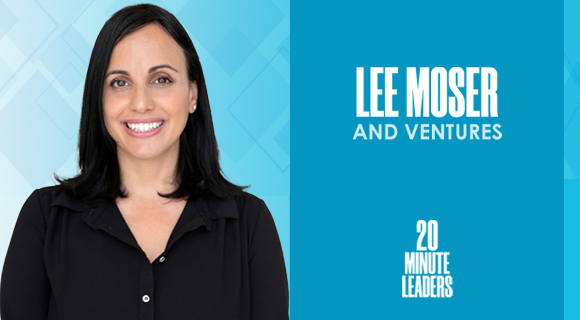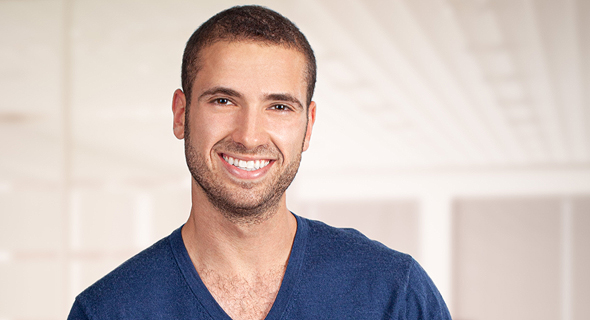“I would say I was always curious about breaking the glass ceiling"
Lee Moser, managing partner and founder of AnD Ventures, talks to Michael Matias about diplomacy, representing Israeli tech overseas, and venture capital
Israeli innovation is the one thing everyone in Washington D.C. could agree on when Lee Moser was chief of staff to the ambassador there, she says. She recognized that the tech scene represented Israel well and that it was another place to create influence, so when she finished being chief of staff, Moser pivoted from diplomacy to venture capital. Now the managing partner and founder of AnD Ventures, she still brings people together. Moser shares that relationships with corporates are important for due diligence and for the entrepreneurs AnD invests in. She explains that they rely on expert help to make quick decisions as the market moves much faster today than it did even a year ago. Moser advises entrepreneurs to not take too long getting their product absolutely perfect: speed and agility are key to today’s market.
Click Here For More 20MinuteLeaders
How do you even get to be chief of staff to the Israeli ambassador?
Everything that we do in life is basically our network. I really believe in that. The connection you have to people, what you do with people, and the history that you share with people. I always wanted to work at the embassy. I saw that Michael Oren became the ambassador. I knew his son, Yoav, and I called him and said, "I want to talk to your dad." I did connect with him, and after four or five months, I got accepted to the job. Being in DC with a quite challenging time between Obama and Netanyahu was a place I wanted to be. I wanted to learn.
What does a chief of staff do in the diplomacy world?
It's a combination of politics, advisory, public affairs. The embassy in DC is like a little government. You need to be the person in the middle that helps the ambassador facilitate all of that. Also, overseeing internal and external politics and policy. It's a lot of networking.
After being chief of staff, is it obvious you're going into venture capital and the high-tech scene?
Not at all. It was really hard for me to get back to Israel. I wanted to influence. I thought that really the best place of influence and making an impact is through innovation and through what we do in this ecosystem. Everything we discussed in DC was controversial. Everything. The only thing that everyone agreed on is that Israeli innovation is the best. After that, I kind of wanted to see it myself.
Walk me through your journey as a venture capitalist.
What we do in AnD Ventures is obviously we like to invest in the best entrepreneurs, and "best" is also great people that you want to work with. We're looking to work with entrepreneurs that are aiming to the moon and want to transform entire industries. We're investing super early. The person itself, the vision, and the technologies are important. What can we build together? For that, we built a studio, a place that an entrepreneur can get various advice, answering all the gaps that you might have to know when you're starting.
Tell me about the thesis behind AnD. You mentioned the cooperation with different companies.
We call ourselves "a company builder-based fund" where we invest early and we help the founder build their companies. We all know that we have amazing entrepreneurs and they're super smart. The validation and the execution definitely need help for many.
We're working with a lot of corporates that we’ve gained relationships with. We are bullish on validation. When we see a company, a part of what we do during the due diligence is help validate with different corporates and experts. The second thing is execution, which for us is connecting to the global world. We can make the world even smaller than what it is today to our entrepreneurs.

Why do you believe it is so important for startups to work with big corporates?
A lot of founders are waiting to build the perfect product before approaching the market. The market is changing so fast. So what you build today, it's not what the needs for tomorrow are. We’re working with many potential clients and with corporates that are looking for innovation, and it really helps shape a better, faster product. You don't need to waste a year and a million dollars of building the perfect MVP. You're building it on the way. Then you reach to market faster than you would have reached with a perfect product.
Is it about design partnerships or is there something else in the work with these corporates that is different?
I think it's the flexibility in mind to pivot quickly for the market needs, less than a successful POC I have on my PowerPoint. More of, how do I think as an entrepreneur and how to adapt to quick changes. I think that’s what it can give to an entrepreneur.
What are we experiencing today that is different?
What I see now, it's not what I saw half a year ago or a year ago. I think we have an ecosystem on steroids. It's a fast environment. You build fast products. I think the scalability of Israeli entrepreneurs today is much bigger and faster than it was. Everything is now faster. When you invest in a company, half a year later you have a full-on round. You need to move faster as an investor.
How does it change the way you think about a deal and do due diligence?
I think also here you need to be faster. You cannot take your time to do a three months’ due diligence. That's why we have our studio that companies, even before investment, can come and work with us and validate their product. We work together and get to know each other. I think you need to make faster decisions if you invest or not.
Does that mean we might be making worse decisions than years ago? What is the compromise of this and the upsides?
Yeah, there is a compromise. First of all, you're going to lose deals. For me, it's hard. Even though I say this is what you need to do, it's still hard for me to make a very fast investment decision. You will need to use your network in doing your DD. You're not the smartest person in the room. We want to use people that work with us and our industry experts to validate the company. We definitely need to use a lot of experts to combine the minds doing the due diligence.
What's going to happen in the next five to 10 years, do you think?
I think what we see today will stop eventually. I think that the companies that are building true deep technology and raise the right round right now will probably be there to last. It's your time to raise money, if you can raise the money and raise the rounds that you think you should have to be able to have the capital in the following years. Because I do think it's a bit of a bubble that will explode soon.
Growing up, what were you really curious about?
So many things. I was always curious about breaking the glass ceiling. I always like to take myself one step forward and try to do things that will be hard for me. I was a tour guide for many years. It gave me confidence, a sense of roots. Even just looking at Israel thousands of years ago. The fragileness of being here and that you need to really try and leave the best and do the best for the time that you're here influenced me a lot.
Where do you gain your inspiration?
My family inspires me and my partners and the founders that we work with. Every day I meet five or six founders and their great ideas and their great vision and ability to help and to learn. I find a home for my curiosity in tech.
If you had to choose a few words to describe yourself, or if I were to ask Roy to describe Lee, what would they be?
He would say I'm fun. I'm brave. I would say a leader.

Michael Matias, Forbes 30 Under 30, is the author of Age is Only an Int: Lessons I Learned as a Young Entrepreneur. He studies Artificial Intelligence at Stanford University, while working as a software engineer at Hippo Insurance and as a Senior Associate at J-Ventures. Matias previously served as an officer in the 8200 unit. 20MinuteLeaders is a tech entrepreneurship interview series featuring one-on-one interviews with fascinating founders, innovators and thought leaders sharing their journeys and experiences.
Contributing editors: Michael Matias, Megan Ryan



